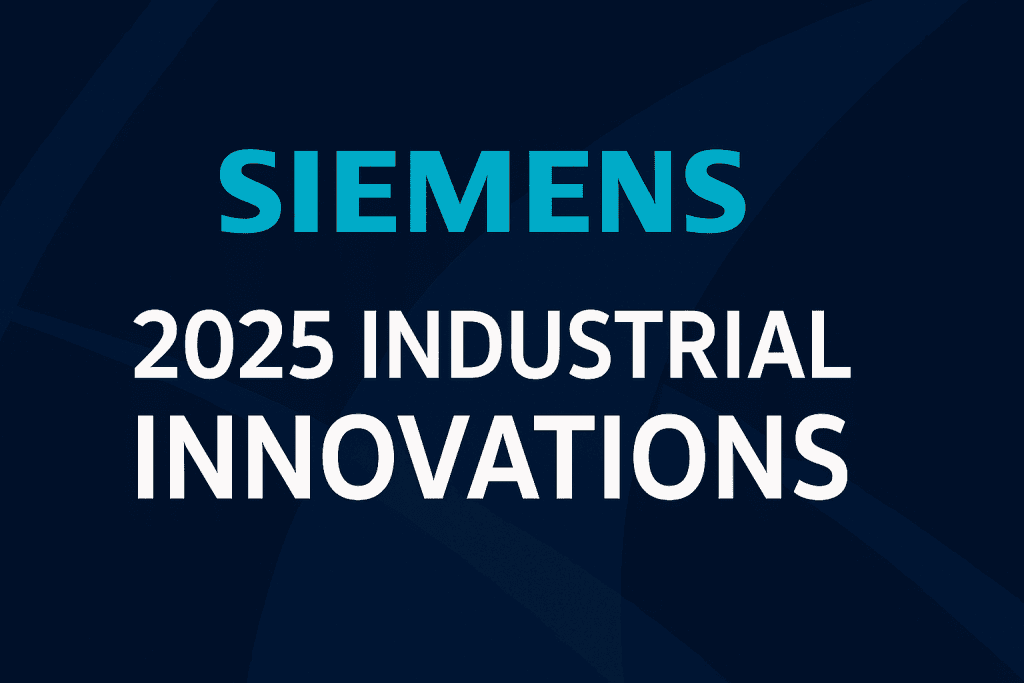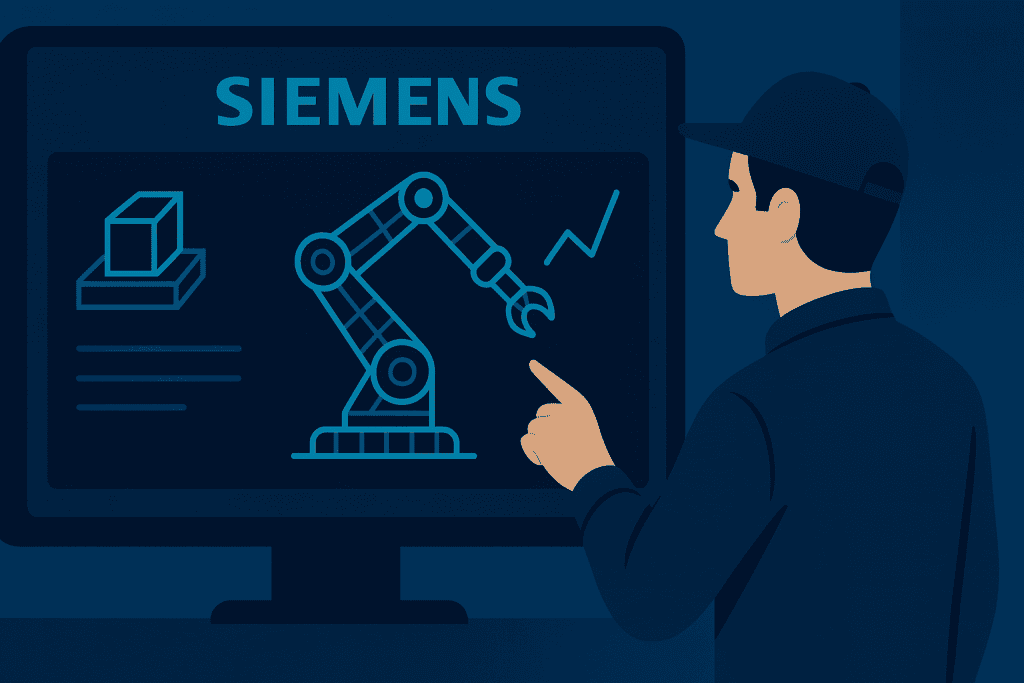
Siemens has once again stepped into the global spotlight, revealing groundbreaking innovations that promise to reshape industries in 2025. As a global leader in manufacturing, digitalization, and sustainability, it introduced three major developments designed to transform how factories operate, how technology integrates into industrial workflows, and how companies meet environmental goals.
These announcements were made at major global events, supported by online showcases, social media buzz, and expert endorsements, positioning it as a powerful driver of change. This article explores each innovation, the context behind it, the key players involved, and what it means for the future of global industry.
Siemens Introduces Smarter Manufacturing Systems

Siemens introduced its first major innovation: AI agents designed to revolutionize manufacturing operations. These agents are embedded directly into production systems, giving machines the ability to process real-time data, self-correct, and continuously learn.
For manufacturers, this breakthrough signals a dramatic shift away from static, pre-programmed workflows toward dynamic, responsive systems. With these AI agents, it can identify potential production bottlenecks, optimize resource use, and adapt to unexpected challenges — transforming traditional assembly lines into intelligent, adaptable operations.
This leap not only improves efficiency but also enhances product quality, making it a frontrunner in the global race for smart manufacturing solutions.
Siemens Enhances Digital Twin Technologies
Siemens’ second key innovation focuses on its enhanced digital twin technology. A digital twin is a virtual replica of a physical system, integrating live operational data to create an accurate, real-time simulation.
By improving its digital twin capabilities, it enables manufacturers to test, refine, and optimize processes before they are implemented on the factory floor. This advancement allows companies to detect inefficiencies, experiment with new designs, and make smarter decisions — all without wasting materials or time.
In short, it is empowering industries to become more agile and competitive, reducing costs and speeding up time-to-market for new products.
Siemens Unveils Sustainability Optimization Tools
The third and perhaps most impactful announcement centers on sustainability. With climate concerns and energy costs rising globally, it unveiled AI-driven energy optimization systems designed to cut emissions, conserve resources, and reduce operational expenses.
These systems analyze factory-wide energy use, identify inefficiencies, and suggest adjustments that lower carbon footprints without compromising performance. As companies worldwide face increasing regulatory and consumer pressure to become more sustainable, it provides a practical pathway to achieving these goals.
For it, this commitment reflects not only technological leadership but also a corporate responsibility to drive innovation that benefits both industry and the planet.
Siemens Showcases Innovations on Global Stage
To launch these innovations, it took to some of the world’s most prestigious industrial stages. It began at Hannover Messe in Germany — the world’s leading industrial trade fair — where CEO Roland Busch delivered an inspiring keynote outlining the company’s vision for the future.
It also showcased its advancements at major expos in Chicago, reinforcing its global influence. For audiences worldwide, it provided detailed online presentations, ensuring that professionals, partners, and stakeholders could access firsthand demonstrations of the technology.
For those who missed the live events, it made the innovation highlights available on YouTube:
Siemens Drives Innovations with Partnerships
Behind every major innovation are visionary leaders and dedicated teams. Its breakthroughs are no exception. CEO Roland Busch leads a global network of engineers, developers, and researchers who have worked tirelessly to deliver these next-generation solutions.
A standout partnership involves NVIDIA, which provides the AI hardware and expertise fueling its smart systems. Together, these companies are advancing the frontiers of industrial AI, setting new benchmarks for intelligent manufacturing and digital transformation.
On social media, tech influencers like Maria Duron helped spread the word, amplifying its impact across global digital platforms:
Siemens Innovations Impact Global Industry
Its 2025 innovations are poised to reshape industries worldwide. Manufacturers stand to benefit from faster production times, enhanced efficiency, and reduced waste. Digital twin technologies open new possibilities for predictive maintenance, product testing, and process optimization.
Perhaps most importantly, its sustainability tools align with global environmental goals, helping companies balance profitability with social responsibility. As governments introduce stricter environmental regulations, it positions itself as a vital partner for companies seeking long-term success in a greener economy.
These advancements also strengthen its competitive edge, positioning it as a global thought leader in advanced technology and sustainability.
Experts Praise Siemens 2025 Announcements
Industry leaders have widely praised its innovations. Roland Busch described the announcements as “a landmark moment for the future of smart manufacturing and sustainability.” Jensen Huang, CEO of NVIDIA, echoed this sentiment, saying, “Together, it and NVIDIA are redefining what’s possible at the intersection of AI and industry.”
Industry analysts also highlighted its commitment to aligning innovation with real-world challenges, ensuring that the technologies are not just futuristic ideas but practical solutions with measurable impact.
Siemens Aligns with Global Industry Trends
Its announcements come at a time when global industries are grappling with multiple challenges — from supply chain disruptions to climate change. Its innovations address these concerns head-on, aligning with key tech trends such as hyperautomation, smart factories, and green energy solutions.
By focusing on tools that enhance resilience and sustainability, it ensures that its solutions meet both current needs and future demands, offering companies a roadmap to navigate a rapidly evolving industrial landscape.
Looking Ahead: Siemens’ Future Plans and Ambitions
Looking to the future, it plans to expand its innovations further, exploring edge computing, hyperautomation, and robotics integration. Analysts expect it to deepen collaborations with global tech partners and target mid-sized manufacturers eager to adopt scalable solutions.
It also plans to strengthen its product portfolio in emerging markets, ensuring that cutting-edge technologies are accessible to a broader range of businesses. This approach promises to extend its influence and accelerate the adoption of smart, sustainable solutions worldwide.
Real-World Success Stories: Siemens Innovations in Practice

Early adopters of its technologies are already reporting significant gains. Automotive companies leveraging its digital twin tools have reduced production errors and shortened development cycles. Manufacturers using its energy optimization systems have cut energy consumption by up to 20%, delivering both environmental and economic benefits.
These real-world results underscore its ability to deliver not just innovation but measurable improvements that translate into competitive advantages for its customers.
Opportunities for Careers and Collaborations with Siemens
Its innovations also open exciting opportunities for professionals seeking careers. As it expands its focus on AI, software development, and sustainability, it is actively recruiting top talent eager to contribute to groundbreaking projects.
Universities, research institutions, and startups are likewise finding new partnership opportunities, working with it to co-develop technologies that extend the reach and impact of its innovations across industries.
Conclusion
Siemens’ 2025 innovations mark a bold leap forward in the global industrial landscape. By integrating AI agents, enhancing digital twin technologies, and championing sustainability, Siemens is reshaping how industries operate, innovate, and grow.
These announcements reaffirm Siemens’ position as a global leader in industrial transformation, inspiring companies worldwide to embrace a future that is smarter, greener, and more resilient. As industries evolve, Siemens’ innovations will play a critical role in shaping the path forward.
Resources
- TechTarget. Siemens follows the path of industrial AI
- Siemens. AI Agents in Manufacturing
- YouTube. Siemens Follows the Path of Industrial AI
- Twitter. Maria Duron’s Siemens Announcement
- TechTarget Blog. Siemens Industrial AI
